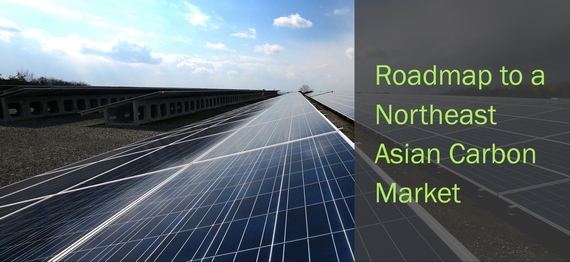Carbon Market Cooperation in Northeast Asia Could Significantly Reduce Emissions

WASHINGTON, D.C., September 29, 2016 – A new Asia Society Policy Institute (ASPI) report argues that linking the carbon markets of China, Japan, and the Republic of Korea could significantly reduce greenhouse gas (GHG) emissions in Northeast Asia.
China, Japan, and Korea, which account for over a quarter of GHG emissions, are each using carbon markets to reduce their emissions footprints. Dr. Jackson Ewing, ASPI Director of Asian Sustainability, argues in the report, Roadmap to a Northeast Asian Carbon Market, that linking those markets could make them more economically, environmentally, and strategically valuable.
Carbon markets cap how much a company or organization can emit and compel them to buy “allowances” for emitting beyond their limit. They create tradeable units, with emitters that fall below their limits selling permits to those that exceed them. When effective, carbon markets provide flexible options for lowering emissions at reduced costs.
Economically, linking can reduce costs by expanding the number of market participants in ways that make the markets more efficient and less volatile. Environmentally, linkage can take away incentives for companies to move their emitting activities from one area to another with weaker regulations. By reducing costs, linkage can also lead these countries to set more ambitious climate change targets. Strategically, linking markets could provide a confidence-building measure for wider Northeast Asian relationships and demonstrate global climate change leadership.
Linking these markets will not be easy. The economies of China, Japan, and Korea are very different, as are the drivers of their emissions. But the fact that each country sees domestic promise in carbon markets offers a valuable starting point. China has launched pilot carbon markets in five major cities and two key provinces, and is transitioning to a national system. Japan is recording credits from supporting emissions-reducing projects in developing countries, and now runs linked trading schemes in Tokyo and Saitama Prefecture. Korea has moved from rapid emissions growth during the 1990s and 2000s to some of the most progressive climate change policies in the world, including the first national carbon market operating in the region.
The next five years will likely shape the place of carbon markets in the climate change strategies of each of these three countries. Ewing points to examples elsewhere in the world to argue that this burst of activity makes it an essential time to plant the seeds for future market links.
The report contains five key recommendations for building a roadmap to link markets:
- China, Japan, and Korea should work now to develop markets with similarities that would make future linkage possible;
- Linking should occur incrementally by forming initially loose market connections and solidifying them over time;
- A community of experts across sectors in the three countries should be built to exchange information, co-create projects, and seed ideas to Northeast Asian policymakers;
- Piloting city-level market links can give governments a laboratory of cross-border connections;
- China, Japan, and Korea should selectively employ international agreements and institutions to help them develop common ground.
“Climate change is a key challenge of our time,” ASPI President and former Prime Minister of Australia Kevin Rudd writes in the report’s foreword. “ASPI will continue to work throughout Northeast Asia to help build carbon market connections, and steer timely and pragmatic policy ideas toward those in a position to make this vision a reality.”
As such, over the next three years ASPI plans to:
- Work with the architects of carbon markets in China, Japan, and Korea to help build political will and develop common standards and practices;
- Promote and help design experimental, near-term pilot efforts to link markets at sub-national levels and across limited sectors;
- Simulate regional market linkages with trading exchange partners, and private sector engagement;
- Bring the capacities of international institutions and experts to Northeast Asia to help design market links;
- Convene exchanges that are frequent, multi-stakeholder, and at both senior policy and technical levels.
For more information, contact: [email protected].

About the Asia Society Policy Institute
With a problem-solving mandate, the Asia Society Policy Institute tackles major policy challenges confronting the Asia-Pacific in security, prosperity, sustainability, and the development of common norms and values for the region. The Institute builds on the mission of the Asia Society, which has sought for 60 years to explain the diversity of Asia to the United States and the complexity of the United States to Asia, and to be a bridge in problem-solving within the region and between Asia and the wider world.
